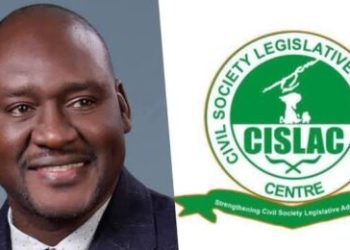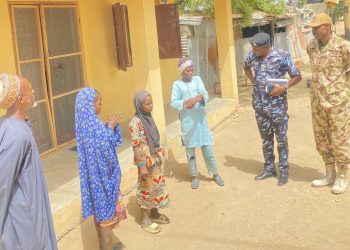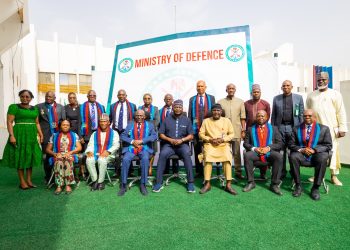By Emmanuel Ado
“Where there is a will, there is a way” -Pauline Kael
Kaduna state has a population of about 10 million, of which 43 percent are under 14 years of age. This explains the massive investment in education by the state government. Persons between 15 and 64 years, regarded as the most critical segment of the population, need both education and employment make up about 54 percent the state’s population, while the 65 years and above bracket that have given their youth to the state and need access to medical services are 3 percent of the total population, according to the last census. The present 10 population would definitely change going by the fertility rate of 7.97 children per woman whenever the next population census is conducted.
The implication of having a youthful population for Kaduna state is not only that it makes it one of the top six cities in Nigeria that 20 percent of its estimated population are unemployed, but makes job creation urgent and critical, because like, they say, an idle mind is the devil’s workshop.
From the very outset, Governor Uba Sani’s singular goal is to make Kaduna state; the Center of Learning, the business and tourism destination of choice for local and foreign investors. It is gladdening that Governor Sani perspectively understands that he must be up and doing in attracting investments to the state which, before its balkanization by the military regime of General Yakubu Gowon, was not just the political capital of the old Northern Region, but also its economic base. Governor Sani’s vision is aggressively driven by the Kaduna State Development Plan 2021-2025, which emphasises investment in agriculture and processing, as key to the creation of millions of jobs for its teeming youth population.
Clearly, job creation is an imperative for Governor Sani and not a choice, which explains why he has also been very aggressive about it.
Industries based in Kaduna state, like the rest of the country, had virtually collapsed due to many factors. These include the Structural Adjustment Programme (SAP) of the General Ibrahim Babangida administration, the petroleum-dollar that fueled consumption of foreign products by an elite that is unenlightened to its own interests, the unresolved energy crisis that has made production unattractive, and trading more attractive, policy summersaults and the dumping of cheaper products from China. All these factors contributed significantly to the collapse of the textiles industry that Kaduna state was renowned for. Even the federal government owned Kaduna Refining and Petrochemical Company (KRPC), one of the nation’s four petroleum refineries and the Peugeot Automobiles Nigeria (PAN) all collapsed and are shadows of their former self.
The effects of the collapse of these industries are many. It stretches from the loss of thousands of jobs to the widespread unemployment, the severe poverty which has also adversely affected the Internally Generated Revenue (IGR) collections, and the unprecedented increase in security threats which, studies have shown, have a direct connection with the unemployment crisis facing not just the state, but Nigeria as a whole, and the reaction of restive youths that believe that the windows of opportunity have been shut against them, which also partly explains their embracement of criminality.
The administration of Governor Uba Sani has certainly gotten it right because it rightly predicated its economic development strategy on agriculture and agro-allied processing, areas in which it has comparative advantage, and on other labour intensive industries with capacity to employ more people. It is also cashing in on the availability of a highly productive workforce, and on its location as a gateway to several states.
So far, the incumbent administration has attracted investments worth over 250 million dollars, expected to create over 50,000 jobs directly and more than 20,000 in indirect jobs. The 50 million dollars Lithium processing plant, a joint venture between the state and Ming Xin Mineral Separation Nigeria Ltd, with an impressive capacity of 1,500 metric tons per day, is already running. Lithium is one of the key components in the manufacture of electric cars. The company also has concluded plans to establish a ceramic tile-producing plant in its second phase, which would not only provide more jobs, but would save Nigeria huge foreign exchange. Presently, Nigeria spends about 2.1 billion dollars in the importation of tiles mostly from Italy and China.
Governor Sani has smartly built his investment strategy around agriculture and the mining sectors that the state has comparative advantages, especially agriculture which contributes 36.69 percent of the state’s Gross Domestic Product (GDP), and is the largest employer of labour, with over 1.3 families (9.6 percent) actively engaged in agricultural production, which explains why Kaduna State is and has remained the undisputed Number One in the production of ginger, maize, tomatoes and ranks second in the production of soybeans, beans and guinea corn.
Indicative of the premium placed on agriculture, Governor Sani, in the 2024 budget, allocated N22.549 billion to Agriculture and has empowered 5,091 small holder farmers with input mechanisms like Rice Harvester, Rice Huller, Hammer Mill, Groundnut oil Extractor, Power Tiller, Multi-crop Thresher, Planter, Vegetable grinder and sprayer. The government equally supported another 10,000 Small Holder Farmers with subsidized inputs comprising: Bags of Fertilizers (7NPK, 3 UREA), and Wheat Seeds. More critical is the establishment of Farmers’ Information Management System (KADA-FIMS) to ease access to financing and to ensure that all initiatives get to the right beneficiaries in the agriculture value chain which would consolidate its position in the sector.
No doubt, economic opportunities abound, but a sizable portion of Kaduna State population has been unfortunately excluded from the established financial system, which is essential and in fact a prerequisite for economic development. This explains why financial inclusion is so important and key to Governor Sani’s economic programme. His target is the inclusion of 2.1 million poor,vulnerable people presently excluded from the financial system. So far an impressive over one million people have been included. The governor, apart from attracting investment, has also continued to implement in a very wholistic manner, other policies that promote economic and social development like access to financial services, credit facilities, insurance coverage, and investment opportunities, areas which had equally inhibited economic growth and efforts to create employment.
In the words of Governor Sani: “It makes socio-economic sense to fundamentally tackle poverty because the society stands to positively reap the benefits in more ways than one, both in the short and long run; in improved income, better healthcare and in overall security of the society, and more”
In June, 2024, Governor Sani paid a return visit to Shijiazhuang, the capital of Hebei Province in China following the initial visit by the province’s Vice Governor to Kaduna State towards forging a stronger and sustainable partnership between the two states. One of the gains is the tripartite agreement for the development of Hebei Industrial Park in Kaduna, in addition to the tripartite Memorandum of Understanding (MOU) between Kaduna State, Hebei Province and CCECC for cooperation in the fields of economy, trade, science and technology, energy, agriculture and infrastructure to promote common prosperity and development.
During the visit, the first ever Kaduna State Investment Summit in China which brought together over 70 industrialists and investors held, with Governor Sani making more than a persuasive case to the Hebei Priovince industrialists to make the state their investment destination of choice,because the state is ready for business. Thankfully for Governor Sani, the Sub-national “Doing Business Report 2018,” published by the World Bank, which ranked Kaduna state as the most improved place for doing business in Nigeria, and number one for registering titles; eloquently spoke for him and resulted in the signing of 12 agreements in agriculture, energy, infrastructural development, and manufacturing. The huge investment opportunities of Kaduna State was nevertheless showcased.
Governor Sani’s efforts have not been limited to attracting foreign investors, as he has equally been reaching out to domestic investors. Recently he performed the groundbreaking ceremonies for the 50million dollar soya oil refining plant (SONA AGRO), for Standard Sacks industries and the first Bio Refinery Plant in Northern Nigeria. When completed, the projects are expected to provide direct and indirect employment for thousands of workers. Other projects in the housing sector include the 200 hectares KDSG/Urban Shelter mass housing, the KDSG/Nigerian Air Force mass housing project, and the KDSG/Nigerian Army mass housing project.
Governor Sani’s drives the Kaduna state’s industrialisation with the zeal of a missionary, due to an unparalleled commitment to profoundly change the economic fortunes of the people who are genuinely central to his politics.
Emmanuel Ado writes from Kaduna, Kaduna state














